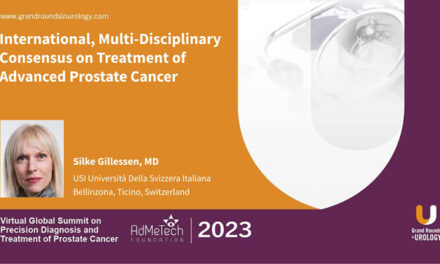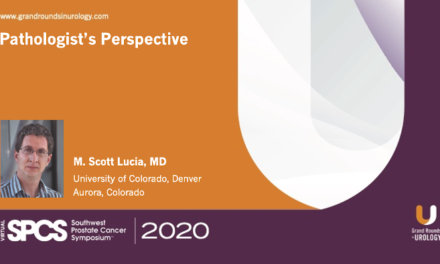
PCa Commentary | Volume 190 – June 2024
Posted by Edward Weber | June 2024
PARADIGM SHIFT — Changes in the Management of De Novo Metastatic
Hormone-Sensitive Prostate Cancer (mHSPC)
De novo metastatic hormone-sensitive prostate cancer refers to a state wherein metastatic spread is diagnosed before any treatment has been administered. Currently, when there are 5 or fewer metastatic lesions (on conventional CT scans) this presentation is termed oligo-metastatic prostate cancer (omHSPC), wherein ‘oligo’ refers to ‘few’. “De novo metastatic hormone-sensitive PC (mHSPC) accounts for 5-10% of all prostate cancer (PC) at diagnosis, but it is responsible for nearly 50% of PC-related deaths.” (Piombino et al., Cancers (Basel).2023). In men with high-risk features (i.e., Gleason score greater than or equal to 4+3, PSA 10 ng/mL or higher) the incidence of mHSPC rises to 20% – 30%. Molecular imaging with PSMA PET scans may reveal a greater number of metastatic sites in these men compared to the less sensitive convention CT imaging.
Currently, different management regimens have been applied to mHSPC based on a subdivision into two arbitrary categories: low-burden (i.e., OmHSPC) and high-burden disease. The distinction was based on the CHAARTED trial criteria of ‘high-burden’ defined as more than 4 metastases to bone and or spread to viscera. Currently, low-burden cancer is treated with Lupron (or a similar drug) combined with an androgen receptor signaling inhibitor (ASRI) (i.e., enzalutamide, apalutamide, or darolutamide) and radiation to the prostate. No chemotherapy is included. Some frail men or those with comorbid conditions may not tolerate the full regimen.
The current treatment for high-burden disease is ADT, ARSI and chemotherapy (docetaxel) — termed “triple therapy,” but without radiation to the prostate. Both regimens result in improved progression free survival as compared to ADT alone.
Paradigm Shift:
The rationale of basing treatment decisions for mHSPC on high or low volume metastatic disease (imaged on CT or bone scans) was critically discussed by Dr. Alicia Morgans (Dana Farber) and Dr. Karim Fizazi (Institute Gustave Roussy) in UroToday: ‘Treating Metastatic Hormone Sensitive Prostate Cancer: Beyond Counting Metastases.” Their opinions were in part derived from a meta-analysis by Vale et al (Lancet Oncology, July 2023) on data from three major clinical trials on treatment of mHSPC. Their conclusion: disregard the distinction of high/low volume metastatic disease and treat all patients with de novo mHSPC, regardless of number of metastatic sites, with “triple therapy”, i.e, ADT. ARSi and chemotherapy plus radiation to the prostate. This triple regimen has been found to prolong both progression-free survival and overall survival.
In the PEACE-1 trial (triple therapy using abiraterone) in the cohort with low-volume mHSPC radiation of the prostate increased the radiographic PFS to 7.5 yrs vs 4.4 yrs compared to the arm with no prostate irradiation. Fizazi added ”… it appears we see a synergy between abiraterone and radiation therapy.”
There is a practical benefit from irradiating the prostate as stated by Dr. Fizazi: “…what we could show in the PEACE-1 [trial] is that using early radiation in men with metastatic disease prevents the onset of local nasty symptoms such as bleeding, pain, obstruction, which of course makes all the patients’ lives miserable, and the effect is quite strong.”
Prostate irradiation also prevents re-seeding metastases from the untreated prostate and is theorized to release antigens to activate the immune system to attack subclinical metastases (the ‘abscopal effect’).
Results of Triple Therapy of mHSPC:
At ASCO 2022 Smith et al. presented the results of the ARASENS trial comparing ADT, darolutamide pus docetaxel to ADT/docetaxel. The triplet led to a 32.5% decrease in the risk of death. Overall survival at 4 yrs was 62.7% (triplet) vs 50.4% (doublet).
In PEACE-1 trail with abiraterone as the ARSI in the triplet the progression-free survival (PFS) was increased 46% and the risk of death improved by 18.5%, respectively. The median PFS was increased to 4.46 yrs compared to 2.22 yrs for androgen suppression plus chemotherapy.
A Confounding Factor:
In the trials referred to above (CHAARTED AND STAMPEDE) imagining for metastatic disease was conducted by CT and bones scans. Currently PSMA PET scans are replacing these less sensitive studies in initial staging of mHSPC based on the strong likelihood that on a per-patient basis more lesions will be diagnosed by PET. However, allowing that the high vs low volume metastatic lesion count may no longer be relevant. The increased sensitivity of PET enables earlier treatment, presumed to add effectiveness, but comparative clinical trials are needed to support this assumption.
Metastasis Directed Radiation Therapy in De novo Oligometastatic HSPC — MDT alone or combined with hormone suppression — That is the Question:
Answer: Both are effective. Each prolongs progression-free survival (PFS) compared to systemic therapy with hormone suppression only (as discussed above). Each serves a different purpose. The combination achieves the longest PFS, however, MDT alone delays the application of ADT and its associated adverse effects. This issue has been multiply studied and the effect of MDT on overall survival is currently undetermined. A randomized clinical trial will be necessary. One observation, however, is clearly established: MDT achieves near 100% local control of the targeted lesions. Still missing are identifying biomarkers to assess the indolence or aggressiveness of the metastatic disease to guide patient selection for MDT. Mutations in BRCA1/2, ATM, RB1 and TP53 reduce the effectiveness of the regimen, but MDT is still appropriate and offers some benefit to men with those mutations.
A randomized clinical trial addressing the issue of ADT or no ADT was reported by Deek et al., (Eur Urol Oncol. 2024). The authors noted that MDT is “increasingly being used in omHSPC,” but “it is currently unclear how to optimally integrate MDT with the standard of care of systemic hormonal therapy.” Deek’s study compared MDT combined with ADT vs ADT alone in 263 men with omHSPC. Five or fewer lesions were targeted, as diagnosed on either conventional or PET imaging. At 5-yr follow-up the biochemical progression-free survival was 24% for combined treatment vs. 11% for ADT only.
MDT combined with intermittent hormone suppression:
A variation of the regimen of MDT combining it with ADT was reported in JAMA Oncol.2023: “Addition of Metastasis-Directed Therapy to Intermittent Hormone Therapy for Oligometastatic Prostate Cancer”. A small clinical trial, EXTEND, reported by Tang et al.( JAMA Oncol. 2023) compared Intermittent ADT alone (44 men) to MDT plus intermittent ADT (45 men).
Five or fewer lesions were targeted. The ADT was achieved with a variety of hormone suppression drugs. Tang considered that the addition of ADT to MDT would take advantage of “the established synergy between hormone therapy and radiation,” and that intermittent ADT would lessen the adverse effects of long-term hormone suppression. The planned duration of ADT was 6 months after which it was discontinued until progression. The trial endpoints were biochemical-free progression and the time to recovery of a testosterone level of >150 ng/dL after stopping ADT.
Findings: At 22 months follow-up the median PFS for the combination arm has not been reached vs. 15.8 months for ADT alone. After recovery of testosterone to >150 ng/dL men in the combined arm maintained testosterone levels above that for a longer period before restarting ADT at disease progression.
BOTTOM LINE:
New analyses suggest that all men with metastatic hormone-sensitive prostate cancer should consider receiving “triple therapy” combining Lupron (or similar drug) with an androgen receptor signaling inhibitor and chemotherapy and include irradiation of the prostate.
Please also visit https://prostatecancerfree.org/prostate-cancer-news for a selection of past issues of the PCa Commentary covering a variety of topics.
“We appreciate the unfailing assistance of the librarians at Providence/Swedish.”
ABOUT THE AUTHOR
Edward Weber, MD, is a retired medical oncologist living in Seattle, Washington. He was born and raised in a suburb of Reading, Pennsylvania. After graduating from Princeton University in 1956 with a BA in History, Dr. Weber attended medical school at the University of Pennsylvania. His internship training took place at the University of Vermont in Burlington.
A tour of service as a Naval Flight Surgeon positioned him on Whidbey Island, Washington, and this introduction to the Pacific Northwest ultimately proved irresistible. Following naval service, he received postgraduate training in internal medicine in Philadelphia at the Pennsylvania Hospital and then pursued a fellowship in hematology and oncology at the University of Washington.
His career in medical oncology was at the Tumor Institute of the Swedish Hospital in Seattle where his practice focused largely on the treatment of patients experiencing lung, breast, colon, and genitourinary cancer and malignant lymphoma.
Toward the end of his career, he developed a particular concentration on the treatment of prostate cancer. Since retirement in 2002, he has authored the PCa Commentary, published by the Prostate Cancer Treatment Research Foundation, an analysis of new developments in the prostate cancer field with essays discussing and evaluating treatment management options in this disease. He is a regular speaker at various prostate cancer support groups around Seattle.




